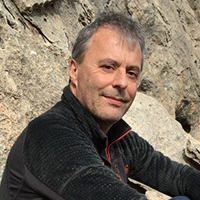What to expect
A Public Lecture by Prof Paul Stewart
Of all the Engineering disciplines, Control is possibly the least familiar to most people, yet is ubiquitous. The other disciplines have concrete and cables, circuit boards and engines, stuff you can see and touch, with centuries of rich history. Control is a bit like a ‘Dark Art’, not properly coming into its own until microprocessors took over from valves and mechanical devices, and fundamentally changed the world around us. All the maths that had been postulated could be applied, the AI theory that Control Engineers had used for decades in solving engineering problems suddenly became commonplace. All the engineering disciplines stand on the ‘shoulders of giants’, Control’s giants got to see the outcome of their genius in their lifetimes – Harold Black invents the negative feedback amplifier in 1927, Rudolf Kalman invents the Kalman filter and gets to hear Buzz Aldrin reading the Kalman Filter output estimations of height above the lunar surface.
In this talk, we will have a look at the history of Control, and trace some of the steps from water clocks to landing on the moon, with some unexpected side-steps into the cold war and espionage.
About Prof Paul Stewart
Professor of Control and Systems Engineering, Founding Research Chair in Engineering and Advanced Manufacturing, Institute of Engineering, Computing and Advanced Manufacturing, University of Cumbria UK.
Prof Stewart served an apprenticeship in the automotive industry and ran his own SME before going to Sheffield University as a mature student to study BEng, Electronic, Control and Systems Engineering in the Department of Automatic Control and Systems Engineering, and subsequently studying for a PhD ‘Adaptive model reference control of permanent magnet AC motors for electric vehicle drivetrains’ while working for Magnetic Systems Technology Ltd.
As a post-doctoral researcher at Sheffield, he developed drive by wire systems for Ford, aircraft simulations for Rolls-Royce, and electronic valve actuation systems for Peugeot PSA and TRW, and latterly became Senior Lecturer in Control and Systems Engineering.
He has subsequently been Head of Aeronautical and Automotive Engineering at Salford University, Founding Head of Engineering with Siemens Energy and Pro Vice Chancellor Research at Lincoln University, Director of Institute for Innovation in Sustainable Engineering at University of Derby and is now Founding Research Chair in Engineering and Advanced Manufacturing at the University of Cumbria.
His funded research collaborations have included Gas Turbine Prognostics, Diagnostics and Failure Modes with Siemens Energy, More Electric Aircraft power distribution and control architectures with Airbus, Low Carbon, Energy Efficient Airport Operations with Manchester and Zurich Airports, Hybrid-Electric Powerplants for Lotus Engineering, and electrical power system architectures for EVs.
He is currently developing novel intelligent sensor networks and data analytics in collaboration with Kidney Research UK, Nottingham University Medical School and Royal Derby Hospital Renal Unit, and research projects with BAE Submarines Barrow, and Siemens Subsea Ulverston.
Event location:
University of Cumbria
58 East India Dock Road
London
E14 6JE
Closest stations:
Westferry (DLR) 4 minutes’ walk
Canary Wharf (Elizabeth Line) 15 minutes’ walk
Bus routes:
University of Cumbria London, served by routes 15, 115, D6

